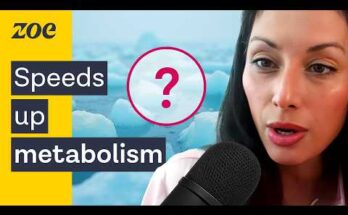## The Shocking Truth About Our Food System: Are We Being Manipulated Into Unhealthy Choices?
We all make food choices every day. But are these choices truly our own? A recent YouTube conversation between Professor Brian Elbel (NYU) and Professor Tim Spector (King’s College London) reveals a disturbing truth: the food industry isn’t just selling us food; it’s actively engineering our desires, influencing our decisions, and impacting our health in alarming ways.
**The Invisible Hands Guiding Our Forks:**
The video, “Why the ‘big food’ industry is killing us – and how to fight back,” unveils the sophisticated strategies employed by the food industry to keep us hooked on ultra-processed foods (UPFs). These aren’t just clever marketing campaigns; they’re meticulously planned operations designed to maximize profits, often at the expense of public health.
From strategically placed items in supermarkets to addictive formulations engineered into our favorite snacks (8:14), the industry utilizes a range of tactics. Professors Elbel and Spector detail how seemingly small changes – like shifts in population demographics or the ever-evolving supermarket landscape (12:07) – can have massive implications for our overall health. The discussion highlights the shocking cost of this unhealthy food obsession on our healthcare systems (16:52), a burden we all ultimately share.
**The Corporate Control and the Illusion of Choice:**
The sheer concentration of power within the food industry is startling. The video reveals that a mere ten corporations (20:36) control a significant portion of what we eat, wielding immense influence over our food choices. Even seemingly innocuous products like Pringles (24:01) are meticulously designed to maximize consumption, employing techniques that exploit our physiological responses.
The discussion also exposes the manipulation within the realm of “healthy” food research (28:15), where corporate interests can skew results and create misleading narratives about the nutritional value of certain products. This corporate influence extends to professional organizations, as highlighted by a study mentioned in the video concerning the Academy of Nutrition and Dietetics (link in video description).
**Fighting Back: Strategies for Reclaiming Our Health:**
But the video isn’t all doom and gloom. Professors Elbel and Spector offer practical strategies to combat this system and regain control over our diets. They provide actionable advice on:
* **Decoding food labels:** Learn how to navigate the often confusing information presented on packaging.
* **Making healthier choices:** Discover practical tips for selecting nutrient-rich, less processed foods.
* **Advocating for policy change:** The professors suggest three key policy changes (32:28) – such as taxing sugary drinks or regulating marketing to children – that could help shift our food culture towards healthier options. The discussion even explores the radical idea of a skull and crossbones warning label on junk food (36:47) and the influence of cartoons on children’s dietary choices (40:32).
The video also introduces ZOE, a tool (44:17) designed to help identify UPFs in our diets. Professor Spector even shares his personal eating habits (48:21), providing a relatable example of how to navigate the complexities of modern food choices.
**The Tobacco Analogy and a Call to Action:**
The conversation ultimately draws a powerful parallel between the tobacco industry’s historical manipulation and the tactics employed by the food industry today (56:01). This comparison underscores the urgency of the situation and the need for collective action.
The video serves as a wake-up call, urging viewers to become more informed consumers, advocate for policy changes, and make conscious choices to improve their health and the health of their communities. The final message is clear: we have the power to fight back and create a food system that prioritizes our well-being over corporate profits. The links provided in the description offer resources such as books, the ZOE app, and a feedback form, allowing viewers to deepen their understanding and participate in the movement for healthier food choices.


